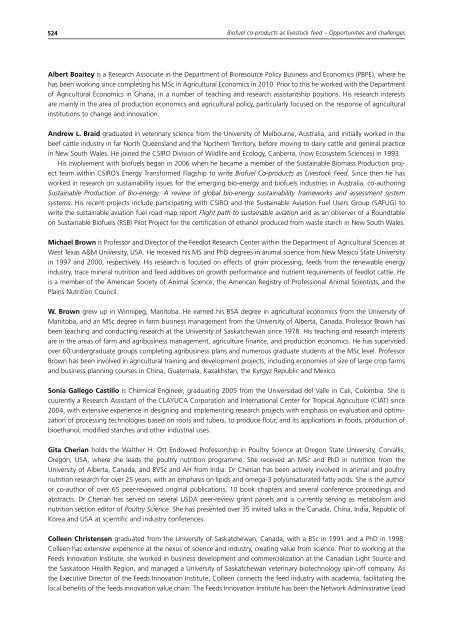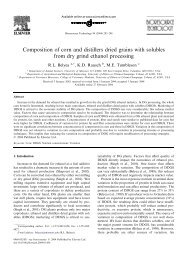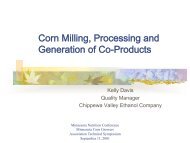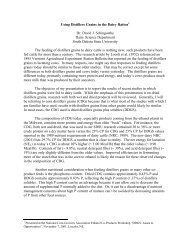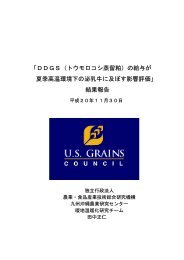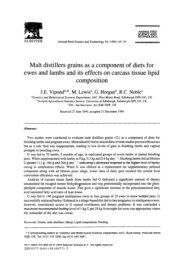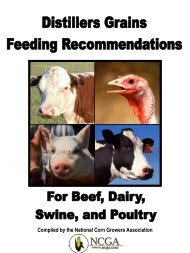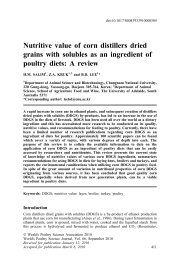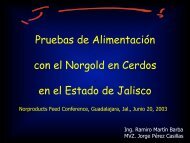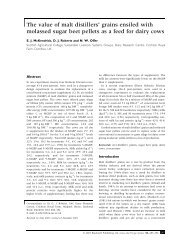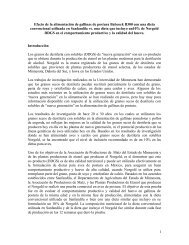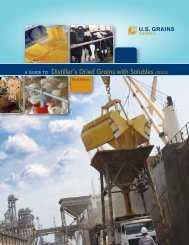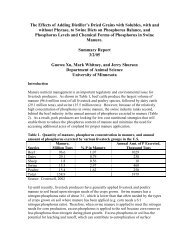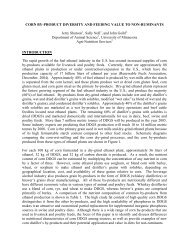Biofuel co-products as livestock feed - Opportunities and challenges
Biofuel co-products as livestock feed - Opportunities and challenges
Biofuel co-products as livestock feed - Opportunities and challenges
- No tags were found...
You also want an ePaper? Increase the reach of your titles
YUMPU automatically turns print PDFs into web optimized ePapers that Google loves.
524<strong>Biofuel</strong> <strong>co</strong>-<strong>products</strong> <strong>as</strong> <strong>livestock</strong> <strong>feed</strong> – <strong>Opportunities</strong> <strong>and</strong> <strong>challenges</strong>Albert Boaitey is a Research Associate in the Department of Bioresource Policy Business <strong>and</strong> E<strong>co</strong>nomics (PBPE), where heh<strong>as</strong> been working since <strong>co</strong>mpleting his MSc in Agricultural E<strong>co</strong>nomics in 2010. Prior to this he worked with the Departmentof Agricultural E<strong>co</strong>nomics in Ghana, in a number of teaching <strong>and</strong> research <strong>as</strong>sistantship positions. His research interestsare mainly in the area of production e<strong>co</strong>nomics <strong>and</strong> agricultural policy, particularly focused on the response of agriculturalinstitutions to change <strong>and</strong> innovation.Andrew L. Braid graduated in veterinary science from the University of Melbourne, Australia, <strong>and</strong> initially worked in thebeef cattle industry in far North Queensl<strong>and</strong> <strong>and</strong> the Northern Territory, before moving to dairy cattle <strong>and</strong> general practicein New South Wales. He joined the CSIRO Division of Wildlife <strong>and</strong> E<strong>co</strong>logy, Canberra, (now E<strong>co</strong>system Sciences) in 1993.His involvement with biofuels began in 2006 when he became a member of the Sustainable Biom<strong>as</strong>s Production projectteam within CSIRO’s Energy Transformed Flagship to write <strong>Biofuel</strong> Co-<strong>products</strong> <strong>as</strong> Livestock Feed. Since then he h<strong>as</strong>worked in research on sustainability issues for the emerging bio-energy <strong>and</strong> biofuels industries in Australia, <strong>co</strong>-authoringSustainable Production of Bio-energy: A review of global bio-energy sustainability frameworks <strong>and</strong> <strong>as</strong>sessment systemsystems. His recent projects include participating with CSIRO <strong>and</strong> the Sustainable Aviation Fuel Users Group (SAFUG) towrite the sustainable aviation fuel road map report Flight path to sustainable aviation <strong>and</strong> <strong>as</strong> an observer of a Roundtableon Sustainable <strong>Biofuel</strong>s (RSB) Pilot Project for the certification of ethanol produced from w<strong>as</strong>te starch in New South Wales.Michael Brown is Professor <strong>and</strong> Director of the Feedlot Research Center within the Department of Agricultural Sciences atWest Tex<strong>as</strong> A&M University, USA. He received his MS <strong>and</strong> PhD degrees in animal science from New Mexi<strong>co</strong> State Universityin 1997 <strong>and</strong> 2000, respectively. His research is focused on effects of grain processing, <strong>feed</strong>s from the renewable energyindustry, trace mineral nutrition <strong>and</strong> <strong>feed</strong> additives on growth performance <strong>and</strong> nutrient requirements of <strong>feed</strong>lot cattle. Heis a member of the American Society of Animal Science, the American Registry of Professional Animal Scientists, <strong>and</strong> thePlains Nutrition Council.W. Brown grew up in Winnipeg, Manitoba. He earned his BSA degree in agricultural e<strong>co</strong>nomics from the University ofManitoba, <strong>and</strong> an MSc degree in farm business management from the University of Alberta, Canada. Professor Brown h<strong>as</strong>been teaching <strong>and</strong> <strong>co</strong>nducting research at the University of S<strong>as</strong>katchewan since 1978. His teaching <strong>and</strong> research interestsare in the are<strong>as</strong> of farm <strong>and</strong> agribusiness management, agriculture finance, <strong>and</strong> production e<strong>co</strong>nomics. He h<strong>as</strong> supervisedover 60 undergraduate groups <strong>co</strong>mpleting agribusiness plans <strong>and</strong> numerous graduate students at the MSc level. ProfessorBrown h<strong>as</strong> been involved in agricultural training <strong>and</strong> development projects, including e<strong>co</strong>nomies of size of large crop farms<strong>and</strong> business planning <strong>co</strong>urses in China, Guatemala, Kazakhstan, the Kyrgyz Republic <strong>and</strong> Mexi<strong>co</strong>.Sonia Gallego C<strong>as</strong>tillo is Chemical Engineer, graduating 2005 from the Universidad del Valle in Cali, Colombia. She iscuurently a Research Assistant of the CLAYUCA Corporation <strong>and</strong> International Center for Tropical Agriculture (CIAT) since2004, with extensive experience in designing <strong>and</strong> implementing research projects with emph<strong>as</strong>is on evaluation <strong>and</strong> optimizationof processing technologies b<strong>as</strong>ed on roots <strong>and</strong> tubers, to produce flour, <strong>and</strong> its applications in foods, production ofbioethanol, modified starches <strong>and</strong> other industrial uses.Gita Cherian holds the Walther H. Ott Endowed Professorship in Poultry Science at Oregon State University, Corvallis,Oregon, USA, where she leads the poultry nutrition programme. She received an MSc <strong>and</strong> PhD in nutrition from theUniversity of Alberta, Canada, <strong>and</strong> BVSc <strong>and</strong> AH from India. Dr Cherian h<strong>as</strong> been actively involved in animal <strong>and</strong> poultrynutrition research for over 25 years, with an emph<strong>as</strong>is on lipids <strong>and</strong> omega-3 poly unsaturated fatty acids. She is the authoror <strong>co</strong>-author of over 65 peer-reviewed original publications, 10 book chapters <strong>and</strong> several <strong>co</strong>nference proceedings <strong>and</strong>abstracts. Dr Cherian h<strong>as</strong> served on several USDA peer-review grant panels <strong>and</strong> is currently serving <strong>as</strong> metabolism <strong>and</strong>nutrition section editor of Poultry Science. She h<strong>as</strong> presented over 35 invited talks in the Canada, China, India, Republic ofKorea <strong>and</strong> USA at scientific <strong>and</strong> industry <strong>co</strong>nferences.Colleen Christensen graduated from the University of S<strong>as</strong>katchewan, Canada, with a BSc in 1991 <strong>and</strong> a PhD in 1998.Colleen h<strong>as</strong> extensive experience at the nexus of science <strong>and</strong> industry, creating value from science. Prior to working at theFeeds Innovation Institute, she worked in business development <strong>and</strong> <strong>co</strong>mmercialization at the Canadian Light Source <strong>and</strong>the S<strong>as</strong>katoon Health Region, <strong>and</strong> managed a University of S<strong>as</strong>katchewan veterinary biotechnology spin-off <strong>co</strong>mpany. Asthe Executive Director of the Feeds Innovation Institute, Colleen <strong>co</strong>nnects the <strong>feed</strong> industry with academia, facilitating thelocal benefits of the <strong>feed</strong>s innovation value chain. The Feeds Innovation Institute h<strong>as</strong> been the Network Administrative Lead


